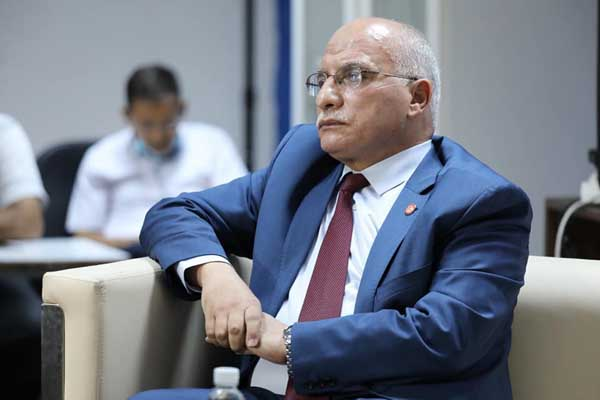
Saida Garrach, a former adviser to the late President Beji Caid Essebsi, reacted to Harouni’s statements by saying that “the state protects Tunisians, not the militias of parties and their offshoots.”
The head of Ennahda’s Shura Council Abdulkarim Harouni drew angry reactions from politicians this week after calling on “sons of the movement” to confront spreading youth protests in the country.
Some of his critics accused the Islamist party Ennahda of engaging in dubious efforts to create a parallel state and a secret security and military apparatus that allows it to use Islamist militias to impose control on the country, accusations denied by Ennahdha.
Harouni, who is close to Ennahda leader Rached Ghannouchi, said, “The sons of Ennahda will be in the field to protect the security of Tunisians, their private and public properties, and their rights, address legitimate demands, and support the security forces in dealing with saboteurs.”
“We extended the call to our activists to protect their state and help their people by preventing the angry mob from destroying what Tunisians and their legitimate state built,” the head of Ennahda’s Shura Council added, stressing that “the proponents of unrest, a second revolution, and a revolution of the hungry did not succeed” in reaching their goal.
Political, human rights and media figures asked the authorities, including the prime minister, the interior minister and the president to take swift action and condemn Harouni’s statements which they described as violating the law and constitution and threatening the unity of state institutions.
In a statement to The Arab Weekly, MP Hatem al-Mliki said that “Harouni’s position violates the constitution and the law, and his statement make clear that Ennahda is still acting with the logic of Jama’a (Islamist grouping) and that of creating a secret apparatus to confront society with militias.”
Mliki called on the head of the government and the parliament speaker to condemn Harouni’s statements that threaten the security and stability of Tunisians, warning that if ” Ennahda’s mercenaries mobolise, there will be serious repercussions, and then the Tunisian army will have to intervene.”
Senior Ennahda leader Mohamed Goumani sought to mitigate the effects of Harouni’s statements, but fell into the same trap when he said that “the civilian forces must support the security forces” and that “Ennahda Movement is present throughout the country, and it is the duty of the movement’s youth to protect private and public property and help with what they can.”
Critics of Ennahda say the statements reveal the “true face” of Islamists and their hostility to the civil state and its institutions, especially the security establishment and the army, the two institutions which they seemingly saw as impervious to their attempts at influence and infiltration to serve Ennahda’s agenda.
Ennahda’s critics argue that the experience of Arab Islamists show how some factions and groups have sought to create parallel security and military agencies to implement their plans.
Such a tactic, the critics warned, could spark a bloody conflict with official security and military institutions, and this has happened in more than one country, especially Egypt and Syria.
Saida Garrach, a former adviser to the late President Beji Caid Essebsi, reacted to Harouni’s statements by saying that “the state protects Tunisians, not the militias of parties and their offshoots.”
Harouni’s remarks reveal that Ennahda is seriously concerned about the spread of youth protests, some of which have raised slogans against the Islamist party, which plays a major role in government, and its leaders. They have especially singled out Ghannouchi, whom some protesters described as the country’s de-facto ruler and say must bear responsibility for bad governance.
Protesters believe that Ennahda’s suggestion to back security forces is not aimed at defending public and private property, as stated in Harouni’s statements, but rather hides the fears that the protests will turn into an uprising toppling the government and parliament, which could lead to Ennahda losing its control over the state.
Ennahda, protesters say, contributed to the creation of a hybrid regime that has failed to bring Tunisians any gains.
Tunisian non-governmental organisations revealed on Thursday that security forces arrested 1,000 people during recent night disturbances.
Political analyst Nabil al-Rabhi said that “Harouni’s statements indicate the collapse of the current system of government and the confusion of Ennahda,” stressing that if the Islamist movement puts vigilantes on the streets, then it would drive the last nail in the coffin of the authority that it wields.
Rabhi told The Arab Weekly that Ennahda, while threatening to resort to militias, also wants to defend its influence in power, especially after its voter share decreased from 1 million to 600,000 in the last elections.
For Ennahda, “the issue is basically existential,” he said.
The ruling parties’ concern is no secret, observers say. The protests have bewildered them, as well as the government of Prime Minister Hichem Mechichi, who, in his latest media appearance, claimed to understand the protesters’ grievances without making clear promises to meet their demands.
Some representatives of the ruling parties view the protests as part of a conspiracy to push security forces to react to protesters aggressively and then be blamed for confrontations, instead of searching for political solutions.
“There are 1,000 people arrested” including many minors, said Bassam Trifi of the Tunisian League for Human Rights, who charged that many arrests had been “arbitrary,” including of people inside their homes.
“Some were arrested without having taken part in the demonstrations,” he told a joint news conference of a dozen groups, also including the journalists’ union and young lawyers’ association.
“We are asking the justice system to look closely into the cases,” Trifi added.
“We will not manage to resolve the crisis in this way. It can only deepen the gulf between the people and the government.”
 Eurasia Press & News
Eurasia Press & News



